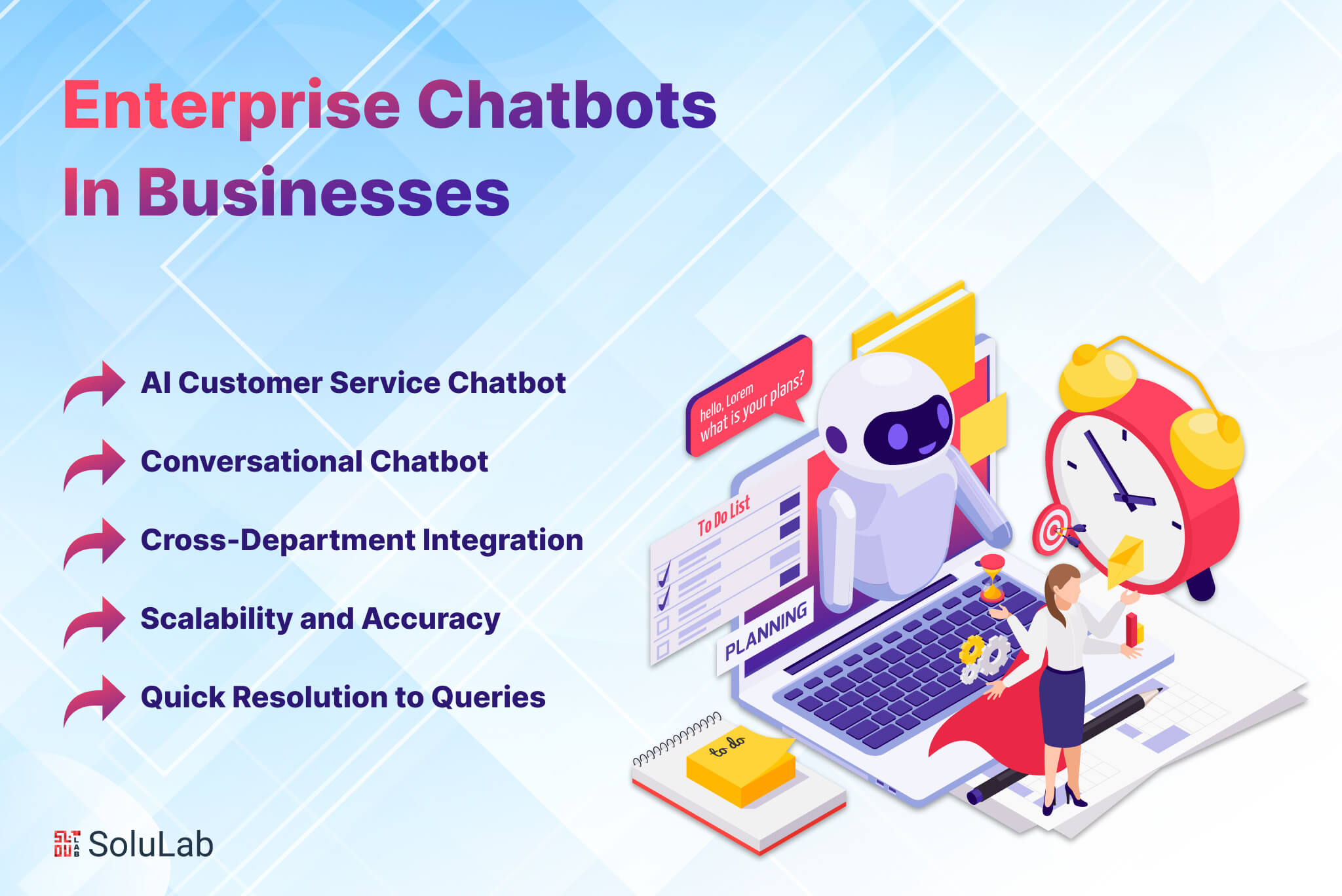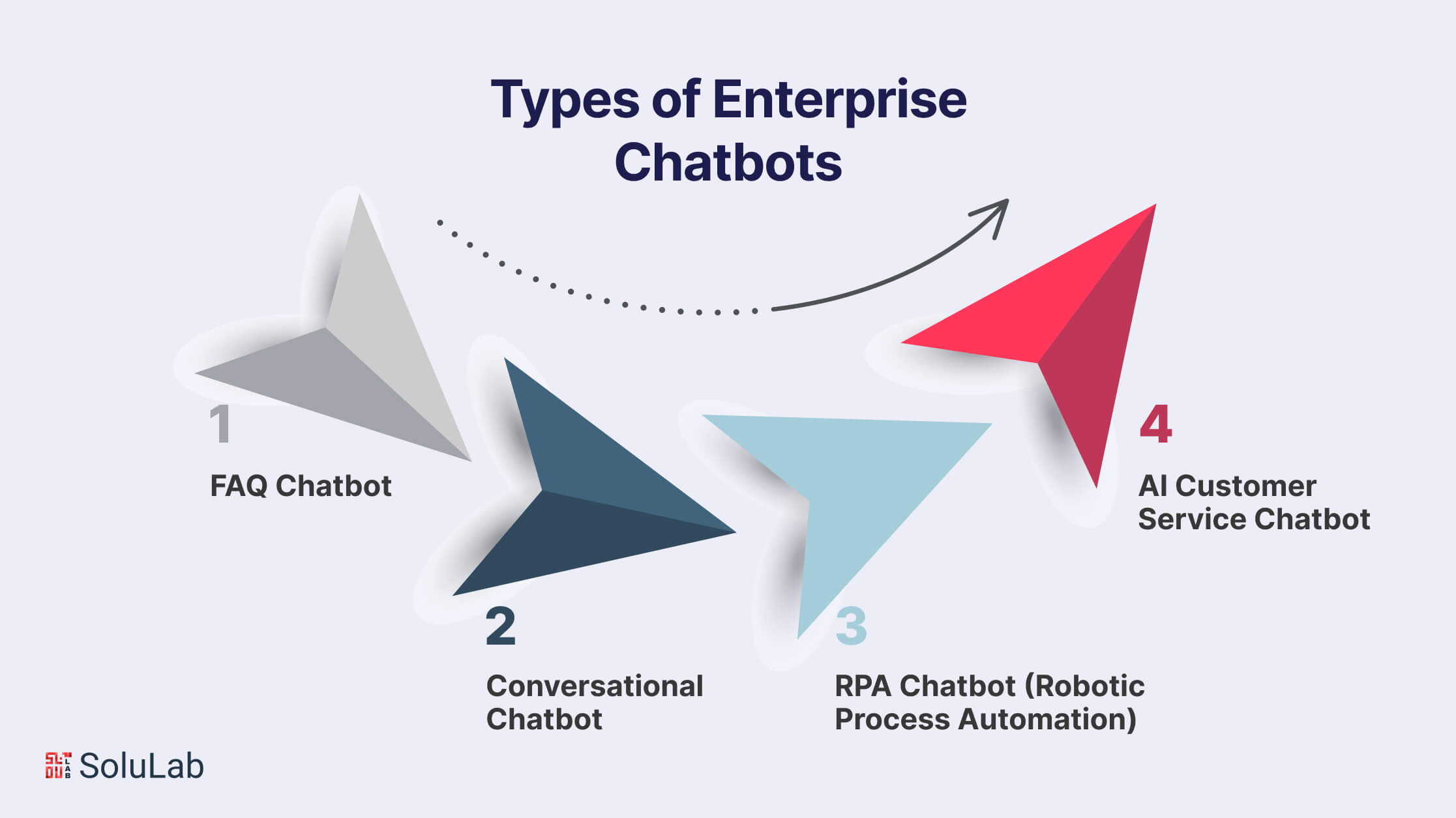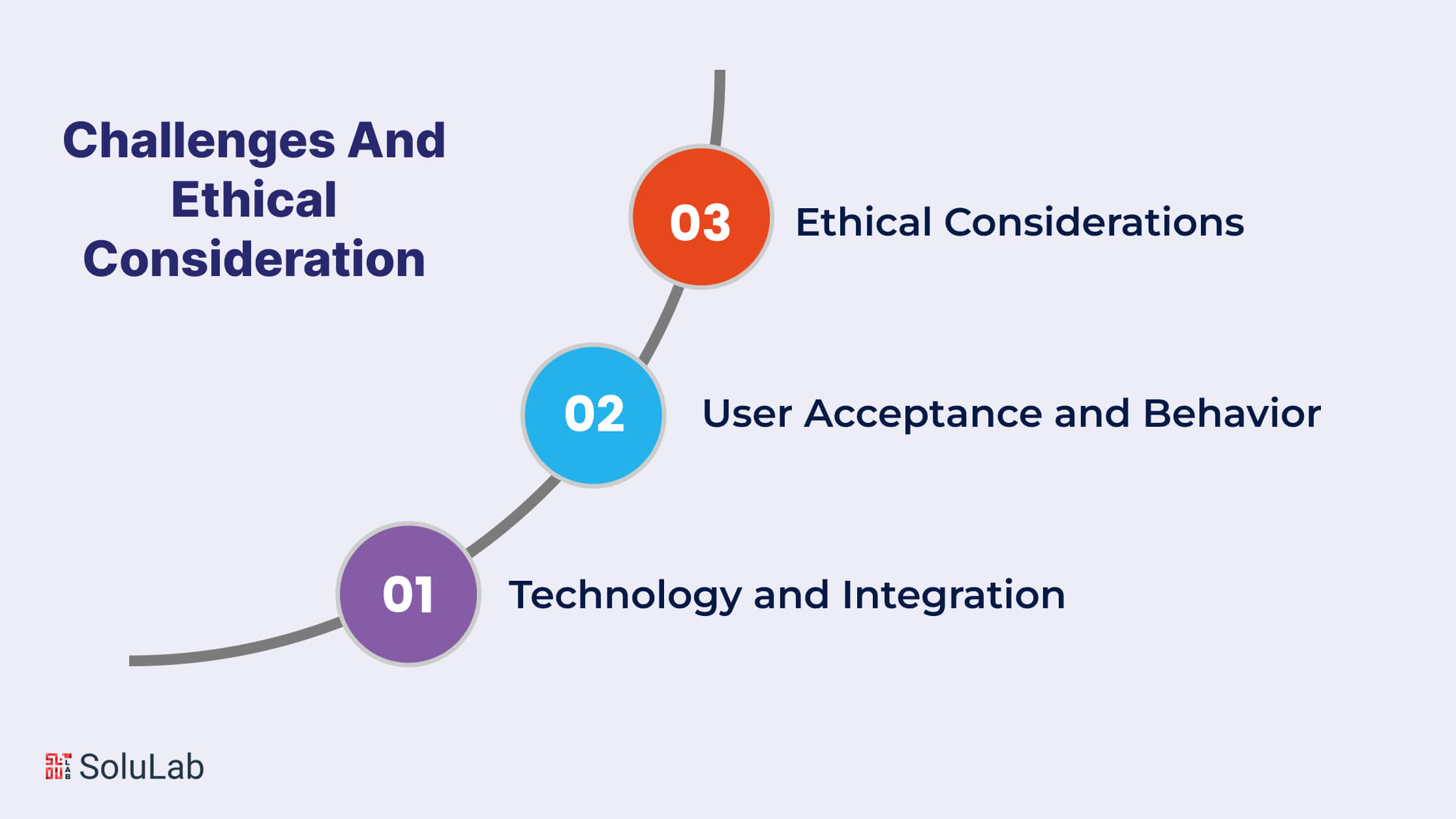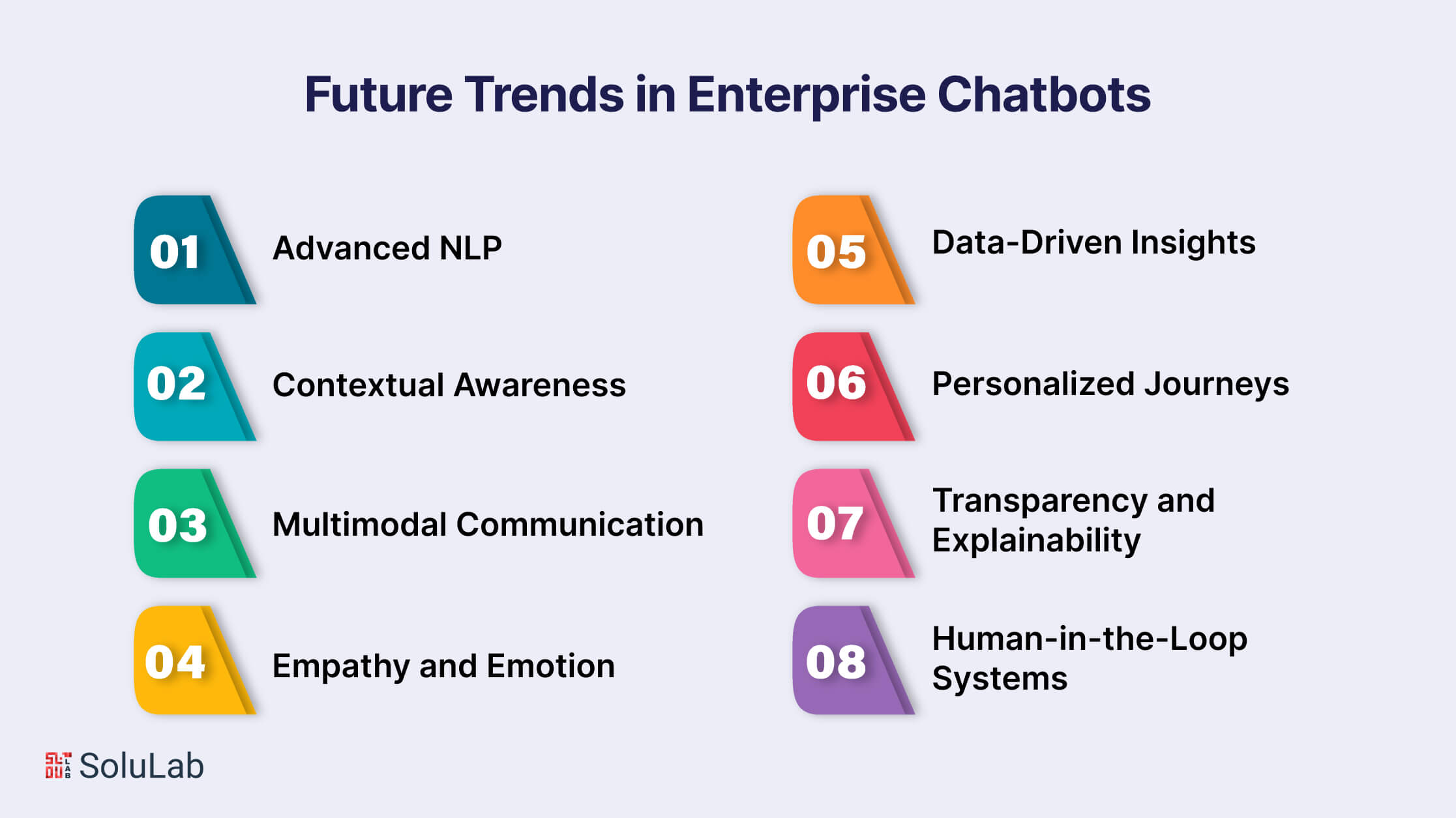Dive into Enterprise Chatbots: Uncover types, benefits, real-world examples, and future trends shaping business communication. The post Enterprise Chatbot-Types, Benefits and Examples appeared first on Blockchain Technology, Mobility, AI and IoT Development Company USA, Canada.

Chatbots powered by artificial intelligence (AI) are becoming very popular in business. More and more companies are starting to use these chatbots because of the many benefits they offer.
The global chatbot market is growing rapidly. It is expected to increase from $2.6 billion currently to $9.4 billion by 2024. That is an average yearly growth rate of almost 30%.
So why are so many businesses using chatbots now?
Chatbots make communication much easier for companies. They can automatically handle many basic conversations that employees would normally have to deal with. This saves companies time and money.
Chatbots are especially helpful in three key areas – marketing, sales, and customer service. They can take over common repetitive tasks from human employees in these departments.
Forward-thinking enterprises are adopting this new technology quickly. Chatbots are seen as the future of business conversations. They are changing how companies interact with potential and existing customers. The use of chatbots in business is exploding. More and more companies are now leveraging artificial intelligence to improve operations and better serve their customers.
Types of Enterprise Chatbots

Enterprise chatbots, driven by artificial intelligence (AI), revolutionize business processes by automating tasks, answering queries, and elevating customer service. Here’s an in-depth exploration of the four main types:
FAQ Chatbot
The FAQ chatbot uses natural language processing (NLP) to interpret and respond to customer inquiries by selecting pre-programmed responses. It streamlines initial customer service tiers, offering efficient solutions to common questions related to password resets, general business inquiries, internal PTO requests, customer onboarding tasks, and simple troubleshooting guides.
Conversational Chatbot
It employs AI to comprehend customer language, facilitating a natural conversational flow. The conversational chatbots help to enhance customer experience by providing quick and engaging responses, resembling interactions with human agents. The technology can grasp company acronyms, typos, and slang, collaborating seamlessly with human agents to deliver superior customer and employee support.
RPA Chatbot (Robotic Process Automation)
RPA Chatbot leverages RPA, an advanced form of business process automation, to execute commands and processes intelligently. It can perform tasks ranging from extracting information from helpdesk tickets to assisting human agents, significantly reducing the time spent on routine workflows.
AI Customer Service Chatbot
AI Customer Service Chat is engineered to provide customer service faster and more efficiently than human counterparts. It uses AI to understand customer inquiries, directing them to the appropriate department or employee promptly. AI chatbots are also capable of identifying and accurately interpreting customers’ feelings, enabling the delivery of precise and instant answers. It also ensures inquiries are routed accurately, improving the overall efficiency of customer service operations.
These diverse types of enterprise chatbots cater to specific business needs, contributing to increased efficiency, enhanced customer satisfaction, and overall improvement in operational workflows. The collaborative integration of these chatbots with human agents showcases the evolving landscape of AI-driven solutions in the realm of customer service and business automation.
Benefits of Enterprise Chatbots
Adding enterprise chatbots improves business in many ways. Their AI skills help companies be more efficient and provide better customer service. Chatbots save money by handling routine requests, freeing up human agents. This boosts productivity and satisfaction by using automation intelligently. Here are the key benefits of using the Enterprise chatbots:
Quick Resolution to Queries
An increasing number of enterprises are recognizing the advantages of chatbots in providing instantaneous responses to website visitors around the clock. This not only meets the growing demand for real-time assistance but also results in operational cost savings. Recognizing that customers despite waiting times, enterprises are deploying chatbots to cater to the need for instant responses.
In fact, a notable use case for chatbots is providing immediate assistance in emergencies, with 35% of users turning to chatbots for swift complaint resolution. Chatbots serve as the initial point of contact, reducing customer churn, and seamlessly directing complex issues to live agents.
Enhanced Brand Experience and Customer Satisfaction
As primary communicators on major platforms, chatbots enhance the brand’s image by showcasing responsiveness in real-time. Even when unable to resolve an issue, a chatbot ensures a smooth handover to a live agent when they are available.
Enterprises can also tailor the chatbot’s design to align with the brand’s tone, color scheme, and fonts, ensuring a consistent brand experience across various platforms.
Increases Customer Engagement
Getting customers is just the beginning; retaining their interest is the real challenge. Customer engagement, or building a lasting relationship, is crucial. A staggering 83% of customers now expect immediate engagement when landing on a website, according to Salesforce research. Chatbots, particularly conversational AI chatbots, enhance engagement by analyzing customer data to personalize conversations, providing quick and relevant answers.
Interoperability Across Departments
A chatbot is a versatile tool, serving different purposes across various enterprise departments. From enhancing website conversion in marketing to automating level one support in customer support, facilitating internal needs in operations, and aiding recruitment, onboarding, and training in HR, chatbots promote interoperability across departments. This capacity to transform both internal and external communication landscapes is a significant advantage for enterprises.
Tailored Solutions
Enterprises now have access to numerous customized chatbot solution providers, offering a more convenient alternative to in-house chatbot development. This approach reduces overall costs and provides native integrations, scalability adjustments, and enhanced security parameters through reliable chatbot vendors.
Streamline Customer Onboarding and Support Scalability
Chatbots play a crucial role in guiding prospects through website interactions. They can be programmed to ask questions and guide customers, simplifying the onboarding process and making it more user-friendly.
Scaling customer support is essential, and chatbots offer an effective solution. They can manage thousands of conversations, providing immediate answers to customer queries. This scalability ensures efficient support, regardless of the time or traffic surge.
Time to Market
By entrusting critical tasks to enterprise chatbots, businesses liberate marketers’ time, allowing them to focus on analytical and strategic activities. This shift provides marketers with the opportunity to develop innovative tactics, devise marketing strategies, and foster business growth without being bogged down by routine tasks.
24/7 Availability
Unlike human representatives, chatbots are available around the clock, providing instant responses to customers. This ensures timely engagement, making customers feel valued and saving their time.
Enterprise Chatbots: Supported Features
Enterprise chatbots gain knowledge with each interaction and get smarter over time. As chatbots seamlessly integrate across departments, they facilitate smoother workflows company-wide through better data sharing. Here are some key features comes with the Enterprise Chatbots:
Advanced Question Handling
Enterprise chatbots are trained on vast company data to enable handling multiple customer questions simultaneously. When various issues arise, the chatbot can use its speed and accuracy stemming from extensive practice to resolve problems. This advanced capability ensures efficient issue resolution.
Cross-Department Integration
Integration with sales, HR, and other company software allows a seamless flow of information across departments. Rather than operating in a silo, enterprise chatbots enhance communication and operations company-wide. This connectivity improves customer service, employee collaboration, and more.
Multilingual Conversations
Supporting global business needs, multilingual chatbots break language barriers using translation capabilities. Customers and employees worldwide can communicate their needs and receive responses in their native tongue. Such versatility caters to global audiences, improving reach and understanding.
Continuous Evolution
With sophisticated monitoring systems, enterprise chatbots constantly learn from interactions to refine conversations. Monitoring chats and feedback allows the AI to evolve based on real experience engaging users. This ongoing chatbot development trend keeps improving customer satisfaction.
Identifying Human Needs
Enterprise chatbots detect complex questions needing a human agent’s expertise. This seamless transfer of conversations provides context to agents so high-level issues are resolved. This ability maintains customer satisfaction despite limitations in AI abilities.
Scalability and Accuracy
Immense volumes of daily interactions are handled with precision by enterprise chatbots. Their AI builds skill through each conversation, navigating complexities. As they scale to increasing customers, more data trains greater capabilities. Reliable, accurate, and comprehensive – that’s the strength of enterprise chatbots.
Examples of Enterprise Chatbots
More companies are now deploying chatbots to boost efficiency. These AI programs have conversational abilities for practical uses like customer service and streamline operations through automation. Here are some popular examples of Enterprise AI Chatbots
Sephora
Sephora uses chatbot to answer product questions from an extensive knowledge base. It guides shoppers to relevant makeup items. The bot even makes personalized recommendations suited to each user. This fine-tuned service delights customers.
Providence
Providence’s Chabot Grace proves useful to handle patient inquiries at scale while connecting them to human doctors when necessary. Grace fields common questions takes symptoms, provides self-care tips, sets appointments, and screens urgent cases. This responsiveness and triaging of needs increases access.
Swedbank
Swedbank’s bot Nina internally handles various document approvals, budget tasks, reporting, and more. This lifted worker productivity up to 85% for those activities it automated.
Leverton
Leverton’s CORE chatbot has contract comprehension skills that far surpass humans in speed and accuracy. Law firms using it have reduced review costs by 80% and improved turnaround times through automation.
Lemonade
Startup Lemonade’s chatbot Jim helps customers through claims rapidly after incidents like home damage. Jim gathers info, assesses the claim, approves payouts, and transfers the money in minutes rather than weeks. Response times under 10 seconds delight users.
Working of Enterprise Chatbots
Working of Enterprise AI involves using smart technology, especially Natural Language Processing (NLP) and Natural Language Understanding (NLU).
Natural Language Processing (NLP)
NLP helps computers understand human language. When you ask a computer a question, like about company rules, NLP helps the computer understand what you mean. For example, if you ask a chatbot about company policies, NLP helps the bot figure out exactly what you’re asking.
Natural Language Understanding (NLU)
NLU goes a step further. It helps the chatbot understand the details and feelings in human language. This tech lets chatbots understand different ways people express things, like using casual language or showing urgency. With NLU, chatbots can give better responses that match how you talk.
Response generation
After the computer understands your question using NLP and NLU, it has to give you a good answer. This means picking the right info or action based on what you asked. Advanced chatbots get better at this over time because they use smart algorithms that learn from each conversation.
Here is an example:
Imagine you walk into a fancy store and are greeted by a helpful assistant who can answer all your questions, take your order, and even recommend new products. That’s kind of like an Enterprise AI Chatbot, but instead of a store, it’s a website or app, and instead of a fancy assistant, it’s a computer program powered by smarts.
You ask a question or make a request: This could be anything from “What’s your return policy?” to “Can I track my order?” The Chatbot listens carefully: It uses a technology called Natural Language Processing (NLP) to understand the meaning of your words, even if you don’t use perfect grammar. It searches its brain: The Chatbot has access to a vast amount of information, stored in its knowledge base. This could include product descriptions, FAQs, customer support documentation, and even real-time data like inventory levels. It picks the best answer: Based on your question and the information it has, the Chatbot chooses the most helpful and relevant response. It might give you a direct answer, offer you some options, or even ask clarifying questions to understand you better. It talks back to you: The Chatbot uses a friendly and natural tone to communicate with you. It might even personalize its responses based on your past interactions or your location.But here’s the cool part: Enterprise AI Chatbots are constantly learning and getting smarter. Every interaction they have helps them improve their understanding of language and the world around them. They can even use machine learning to identify patterns and make predictions, like suggesting similar products you might like or recommending the fastest shipping option.
Set Up Business Chatbots in 3 Simple Steps
Setting up chatbots for your business might seem challenging, but you can do it smoothly by following these three steps:
Understand Your Business Needs
Figure out what your business aims to achieve and identify the best use for a chatbot. Decide if it’s for customer service or automating internal operations.
Choose a Chatbot Platform for Businesses
Once you know what you need, pick a platform that has all the tools you require. Look for features like integration with external systems, updated security measures, and advanced AI technology. Check out some recommended platforms listed at the end.
Train and Launch Your Chatbot
After selecting a platform, train your chatbot by exposing it to various scenarios resembling real customer or employee interactions. This ensures it performs accurately when live. Finally, launch your chatbot on your chosen channels and start enjoying the benefits!
Challenges And Ethical Consideration In Enterprise Chatbot Adoption

Enterprise chatbots are rapidly transforming customer service, offering 24/7 assistance, personalized interactions, and faster resolutions. However, implementing and effectively using chatbots comes with its own set of challenges. Here are some of the key hurdles businesses face:
Technology and Integration
Natural Language Processing (NLP): Current NLP capabilities, while impressive, can still struggle with complex language, sarcasm, and slang. Misinterpretations can lead to frustrating user experiences and inaccurate information. Integration with Existing Systems: Integrating chatbots with back-end systems like CRM and ticketing platforms can be complex and expensive. Siloed data can hinder the chatbot’s ability to access and provide comprehensive information. Security and Privacy: Ensuring data security and user privacy is critical, especially when handling sensitive information. Robust security measures and clear data privacy policies are essential.User Acceptance and Behavior
User Expectations: Users may have unrealistic expectations about chatbots, expecting them to handle any query like a human agent. This can lead to disappointment and frustration if the chatbot’s capabilities are limited. User Skepticism: Some users may be hesitant to trust or interact with a chatbot, preferring human interaction. Building trust and demonstrating the chatbot’s value is crucial for adoption. User Training and Education: Users need to be trained on how to interact effectively with the chatbot, including providing clear instructions and avoiding ambiguous language.Ethical Considerations
Bias and Fairness: Chatbots trained on biased data can perpetuate discriminatory practices. It’s crucial to ensure training data is diverse and representative to avoid biased outputs. Transparency and Explainability: Users deserve to understand how the chatbot arrives at its decisions, especially when it impacts their lives. Transparency in algorithms and decision-making processes is key. Job Displacement: Concerns exist about chatbots replacing human customer service agents. Responsible adoption should focus on upskilling existing agents and creating new opportunities alongside chatbot implementation.Future Trends in Enterprise Chatbots

The future of Enterprise Chatbots is full of possibilities. These intelligent and evolving assistants promise to make our lives easier, more efficient, and even more personalized.
1. Advanced NLP: Natural Language Processing will get even more sophisticated, allowing chatbots to handle nuance, humor, and cultural references with ease. Say goodbye to robotic interactions and hello to truly natural conversations.
2. Contextual Awareness: Chatbots will be able to learn from past interactions and adapt their responses based on the user’s context. Imagine a bot remembering your preferences and adjusting its recommendations or troubleshooting based on your previous experiences.
3. Multimodal Communication: Build AI Chatbots that will integrate with visual and audio technologies, understanding images, videos, and even voice queries. Think of a virtual assistant who walks you through a product demo or helps you navigate a complex form using voice commands.
4. Empathy and Emotion: Chatbots will learn to recognize and respond to human emotions, providing personalized support and creating deeper connections. Imagine a customer service bot that identifies frustration and offers calming techniques or an empathetic ear.
5. Data-Driven Insights: Enterprise Chatbots will analyze user data to predict needs and proactively offer assistance. Imagine a bot reminding you about a car service appointment you forgot or pre-filling forms based on your past entries.
6. Personalized Journeys: Chatbots will tailor the user experience to individual preferences and behaviors. Think of a travel bot curating a customized itinerary based on your interests and budget, or a shopping bot suggesting items you’d actually love.
7. Transparency and Explainability: Users will have more control and understanding of how chatbots make decisions, ensuring fairness and building trust. Imagine knowing why a chatbot recommended a certain product or denied your request.
8. Human-in-the-Loop Systems: Collaboration between humans and chatbots will be key, ensuring responsible AI development and ethical considerations stay at the forefront. Think of a human supervisor overseeing chatbot interactions and stepping in when needed.
Conclusion
It is evident that these AI-powered tools play a crucial role in changing how businesses communicate. When chatbots become part of a company’s systems, it’s a big step toward making operations more effective, customer-focused, and driven by data. The strength of these chatbots comes from their ability to make interactions smooth, offer useful insights through analytics, and adjust to the changing needs of the business. In today’s digital age, choosing to adopt enterprise chatbots isn’t just a choice; it’s a smart move for businesses wanting to succeed in a competitive and always-evolving market.
At SoluLab, We create customized Enterprise chatbots for businesses that fit their specific needs. Our goal is to make chatbots that work just right for your company. Whether you need help with customer service, sales, or something else, we’ve got you covered. Let us customize a chatbot that suits your business perfectly. We’re here to make things easy for you. Choose SoluLab, your trusted chatbot development company, for an efficient, user-friendly, and custom-tailored chatbot solution that perfectly suits your business needs.
FAQs
1. What is an Enterprise Chatbot?
An Enterprise Chatbot is like a smart assistant for businesses. It’s a computer program that talks with people to help them with tasks, answer questions, or provide information. Think of it as a virtual team member that communicates through chat.
2. How do Enterprise Chatbots work?
These chatbots use artificial intelligence (AI) to understand and respond to human language. They learn from conversations and data, getting smarter over time. They can be integrated into various systems to fetch information and perform tasks.
3. What benefits do Enterprise Chatbots bring to businesses?
Enterprise Chatbots save time and effort by handling routine tasks and answering common questions. They enhance customer support, automate processes, and improve overall efficiency. They are available 24/7, providing instant assistance.
4. Can Enterprise Chatbots be customized for specific business needs?
Yes, they can! Businesses can tailor chatbots to suit their unique requirements. Customization involves training the chatbot on industry-specific information, integrating it with existing systems, and defining its role in the organization.
5. Are Enterprise Chatbots only for customer service?
No, they can do much more! While customer service is a common use, Enterprise Chatbots can assist with internal processes, HR tasks, sales inquiries, and more. They are versatile tools that adapt to various business needs.
6. Do users need special training to interact with Enterprise Chatbots?
Not at all. Enterprise Chatbots are designed to understand natural language, so users can communicate with them just like they would with a person. No special training is required, making them user-friendly for everyone.
7. How secure are Enterprise Chatbots with sensitive information?
Security is a priority. Enterprise Chatbots are built with robust security measures to protect sensitive data. They follow strict access controls, encryption standards, and comply with data privacy regulations to ensure the confidentiality of information.
The post Enterprise Chatbot-Types, Benefits and Examples appeared first on Blockchain Technology, Mobility, AI and IoT Development Company USA, Canada.




